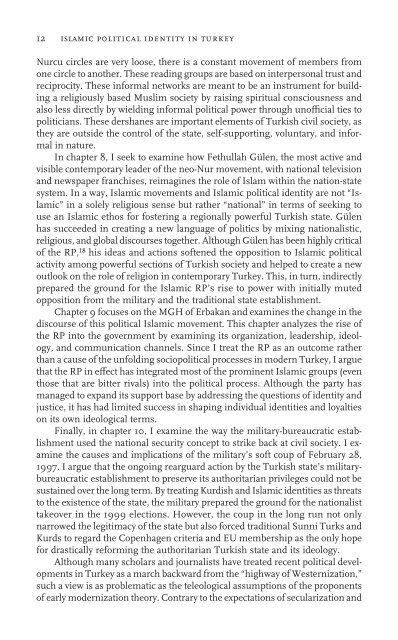You also want an ePaper? Increase the reach of your titles
YUMPU automatically turns print PDFs into web optimized ePapers that Google loves.
12 islamic political identity <strong>in</strong> turkeyNurcu circles are very loose, there is a constant movement of members fromone circle to another. These read<strong>in</strong>g groups are based on <strong>in</strong>terpersonal trust andreciprocity. These <strong>in</strong>formal networks are meant to be an <strong>in</strong>strument for build<strong>in</strong>ga religiously based Muslim society by rais<strong>in</strong>g spiritual consciousness andalso less directly by wield<strong>in</strong>g <strong>in</strong>formal political power through unoYcial ties topoliticians. These dershanes are important elements of Turkish civil society, asthey are outside the control of the state, self-support<strong>in</strong>g, voluntary, and <strong>in</strong>formal<strong>in</strong> nature.In chapter 8, I seek to exam<strong>in</strong>e how Fethullah Gülen, the most active andvisible contemporary leader of the neo-Nur movement, with national televisionand newspaper franchises, reimag<strong>in</strong>es the role of Islam with<strong>in</strong> the nation-statesystem. In a way, <strong>Islamic</strong> movements and <strong>Islamic</strong> political identity are not “<strong>Islamic</strong>”<strong>in</strong> a solely religious sense but rather “national” <strong>in</strong> terms of seek<strong>in</strong>g touse an <strong>Islamic</strong> ethos for foster<strong>in</strong>g a regionally powerful Turkish state. Gülenhas succeeded <strong>in</strong> creat<strong>in</strong>g a new language of politics by mix<strong>in</strong>g nationalistic,religious, and global discourses together. Although Gülen has been highly criticalof the RP, 18 his ideas and actions softened the opposition to <strong>Islamic</strong> politicalactivity among powerful sections of Turkish society and helped to create a newoutlook on the role of religion <strong>in</strong> contemporary <strong>Turkey</strong>. This, <strong>in</strong> turn, <strong>in</strong>directlyprepared the ground for the <strong>Islamic</strong> RP’s rise to power with <strong>in</strong>itially mutedopposition from the military and the traditional state establishment.Chapter 9 focuses on the MGH of Erbakan and exam<strong>in</strong>es the change <strong>in</strong> thediscourse of this political <strong>Islamic</strong> movement. This chapter analyzes the rise ofthe RP <strong>in</strong>to the government by exam<strong>in</strong><strong>in</strong>g its organization, leadership, ideology,and communication channels. S<strong>in</strong>ce I treat the RP as an outcome ratherthan a cause of the unfold<strong>in</strong>g sociopolitical processes <strong>in</strong> modern <strong>Turkey</strong>, I arguethat the RP <strong>in</strong> eVect has <strong>in</strong>tegrated most of the prom<strong>in</strong>ent <strong>Islamic</strong> groups (eventhose that are bitter rivals) <strong>in</strong>to the political process. Although the party hasmanaged to expand its support base by address<strong>in</strong>g the questions of identity andjustice, it has had limited success <strong>in</strong> shap<strong>in</strong>g <strong>in</strong>dividual identities and loyaltieson its own ideological terms.F<strong>in</strong>ally, <strong>in</strong> chapter 10, I exam<strong>in</strong>e the way the military-bureaucratic establishmentused the national security concept to strike back at civil society. I exam<strong>in</strong>ethe causes and implications of the military’s soft coup of February 28,1997. I argue that the ongo<strong>in</strong>g rearguard action by the Turkish state’s militarybureaucraticestablishment to preserve its authoritarian privileges could not besusta<strong>in</strong>ed over the long term. By treat<strong>in</strong>g Kurdish and <strong>Islamic</strong> identities as threatsto the existence of the state, the military prepared the ground for the nationalisttakeover <strong>in</strong> the 1999 elections. However, the coup <strong>in</strong> the long run not onlynarrowed the legitimacy of the state but also forced traditional Sunni Turks andKurds to regard the Copenhagen criteria and EU membership as the only hopefor drastically reform<strong>in</strong>g the authoritarian Turkish state and its ideology.Although many scholars and journalists have treated recent political developments<strong>in</strong> <strong>Turkey</strong> as a march backward from the “highway of Westernization,”such a view is as problematic as the teleological assumptions of the proponentsof early modernization theory. Contrary to the expectations of secularization and




